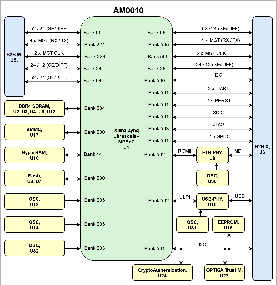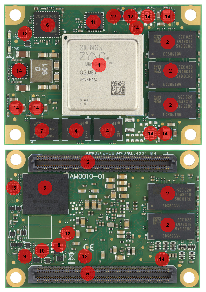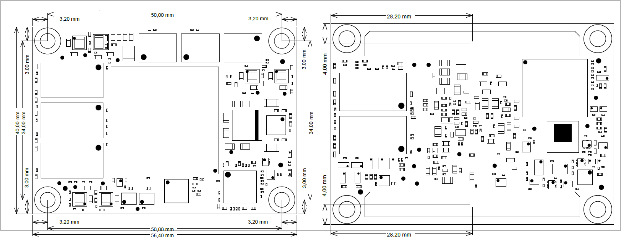Template Change history:
|
Important General Note:
|
----------------------------------------------------------------------- |
Note for Download Link of the Scroll ignore macro:
|
Overview
The Trenz Electronic AM0010 module is an industrial grade module based on AMD Xilinx.
Refer to http://trenz.org/am0010-info for the current online version of this manual and other available documentation.
Notes :
|
Key Features
Note: → See examples fro different types <Series Name> TRM Template section examples#%3CSeriesName%3ETRMTemplatesectionexamples-KeyFeatures |
|
Block Diagram
add drawIO object in Scroll Ignore section and add reference image in Scroll Only.
|
|
Main Components
Notes :
|
|
- FPGA, U1
- DDR4, U2, U3, U9, U12, U14
- eMMC, U17
- Quad SPI Flash, U6, U7
- Connector, J5, J6
- Ethernet Transceiver, U8
- HyperFlash, U16
- EEPROM, U15
- OPTIGA Trust M, U27
- CryptoAuthentication, U24
- USB Transceiver, U10
- Oscillator, U13, U14, U30, U31, U32
- Analog Multiplexer, U38
- Power Supply, U5, U11, U18, U19, U20, U21, U22, U23, U28
Initial Delivery State
|
|
Signals, Interfaces and Pins
For subsection examples see: <Series Name> TRM Template section examples#%3CSeriesName%3ETRMTemplatesectionexamples-Signals,InterfacesandPins
|
Connectors
1) IO CNT depends on assembly variant. E.g. the MGTs are not available for all FPGAs |
Test Points
you must fill the table below with group of Test Point which are indicated as TP in a schematic. If there is no Test Point remarked in the schematic, delet the Test Point section. Example:
|
|
On-board Peripherals
Notes : In the on-board peripheral table "chip/Interface" must be linked to the corresponding chapter or subsection by assigning advance link using: #NameOfTheSection Example:
|
|
For example subsections see: <Series Name> TRM Template section examples#%3CSeriesName%3ETRMTemplatesectionexamples-On-boardPeripherals |
Configuration and System Control Signals
|
1) Direction:
2) See UG1085 for additional information. 3) See Recommended Operating Conditions. |
Power and Power-On Sequence
Enter the default value for power supply and startup of the module here.
Link to Schematics, for power images or more details |
Power Rails
List of all Powerrails which are accessible by the customer
|
1) Direction:
|
Recommended Power up Sequencing
List baseboard design hints for final baseboard development. |
1) (optional) 2) (on module) 3) See DS925 for additional information. |
Board to Board Connectors
|
Technical Specifications
Absolute Maximum Ratings *)
1) It is possible to use a resistor instead of the LDO but then, consider the different min (-0.500 V) / max (2.000 V) values. |
*) Stresses beyond those listed under Absolute Maximum Ratings may cause permanent damage to the device. These are stress ratings only, which do not imply functional operation of the device at these
or any other conditions beyond those indicated under Recommended Operating Condition. Exposure to absolute-maximum rated conditions for extended periods may affect device reliability.
Recommended Operating Conditions
This TRM is generic for all variants. Temperature range can be differ depending on the assembly version. Voltage range is mostly the same during variants (exceptions are possible, depending on custom request)
Operating temperature range depends also on customer design and cooling solution. Please contact us for options.
- Variants of modules are described here: Article Number Information
- Modules with commercial temperature grade are equipped with components that cover at least the range of 0°C to 75°C
- Modules with extended temperature grade are equipped with components that cover at least the range of 0°C to 85°C
- Modules with industrial temperature grade are equipped with components that cover at least the range of -40°C to 85°C
- The actual operating temperature range will depend on the FPGA / SoC design / usage and cooling and other variables.
1) Using a resistor instead of the LDO is possible which leads to different min (1.2 V) / max (1.89 V) values. |
Physical Dimensions
Module size: 56.4 mm × 40 mm. Please download the assembly diagram for exact numbers.
Mating height with standard connectors: 5 mm.
PCB thickness: 2 mm.
In 'Physical Dimension' section, top and bottom view of module must be inserted, information regarding physical dimensions can be obtained through webpage for product in Shop.Trenz, (Download> Documents> Assembly part) for every SoM. For Example: for Module TE0728, Physical Dimension information can be captured by snipping tools from the link below:
|
|
Currently Offered Variants
Set correct link to the shop page overview table of the product on English and German. Example for TE0706: ENG Page: https://shop.trenz-electronic.de/en/search?sSearch=TE0706 DEU Page: https://shop.trenz-electronic.de/de/search?sSearch=TE0706 |
| ||||
Revision History
Hardware Revision History
Set correct links to download Carrier, e.g. TE0706 REV02: TE0706-02 -> https://shop.trenz-electronic.de/Download/?path=Trenz_Electronic/Modules_and_Module_Carriers/4x5/4x5_Carriers/TE0706/REV02/Documents Note:
|
|
|
Hardware revision number can be found on the PCB board together with the module model number separated by the dash.
Document Change History
|
|
Disclaimer
|
|



